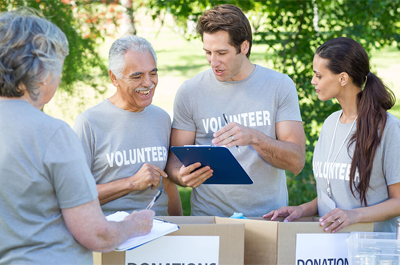
Credit: Adobe Stock
One Surprising Way Older Adults Can Get Healthier
By Dr. Ann Hwang for Next Avenue
Whether or not we actually do the right things to improve our health, many of us probably assume we know what they are. Walk more. Quit smoking. Eat healthier.
It’s a familiar list, and a good one. As a primary care doctor, I spend plenty of time counseling people to do exactly these things. But here’s another, less familiar thing I think you should consider: get engaged in your community.
The Benefits of Connection
Civic engagement may not be on the top of everyone’s to-do list, but it probably should be. There is intriguing evidence to suggest that people who are engaged in their communities — through activities like participating in local organizations or volunteering — could also have better health.
For example, older adults who volunteer are less likely to have high blood pressure or cardiovascular disease; they face a lower risk of cognitive impairment and they might even delay death.
Additionally, forming social connections might be particularly helpful in combatting social isolation and loneliness, a growing problem especially among older adults. People who are socially isolated may have increased risk for premature death and some have estimated that the negative impact of social isolation and loneliness could be a greater public health threat than obesity.
Living alone’ having a mobility or sensory impairment; going through a major life transition (like losing a spouse) or being a caregiver for someone with a severe impairment are common scenarios facing older adults. They are also risk factors for isolation.
Yet despite the potential benefits, the average American is becoming less and less engaged. Participation in clubs and civic organizations has fallen by more than half over the last 25 years and polls suggest growing distrust and pessimism about our political system.
Stories of Hopeful Change
In our work at the Center for Consumer Engagement in Health Innovation, we’ve seen the possibility and promise of change. We support advocates and leaders — particularly people who have significant health care needs or come from low-income communities — who are actively engaged in working to make the health system more responsive and person-centered.
People like Lezrette Hutchinson, a working mother of three who experienced homelessness after a fire and had significant health challenges after a diagnosis of sarcoidosis, a serious inflammatory condition. Hutchinson got treatment, but she didn’t stop there. She formed a recreational support group for people 50+ and joined the patient advisory board of her health system, saying “we wanted doctors to listen to us.”
Now, despite her ongoing illness, she feels the power of having a larger purpose. Hutchinson says: “I became an activist so I could let new people know it was going to be OK.”
Or Kathy Paul, a 69-year-old woman who advocates for better health care policies for older adults with the Massachusetts Senior Action Council. When her husband died, it was a turning point in her life.
She explains, “With more time on your hands, what do you do? Just sit in the house, stare at the walls and complain, or get out and do something about it? What our group likes to say is, ‘We don’t just take it, we take charge!’”
Everybody Wins
As the National Academy of Medicine recently summarized, actively engaging consumers as partners in health care is a win-win proposition, for all of us and for the health system. Health care leaders and policymakers interested in improving health would do well to focus on building more opportunities for engagement for consumers and the communities they serve.
So if you’d like to improve your health, consider looking for ways to become active in your community. Get involved with a local community organization, drive someone to the polls, join a committee at your place of worship. Find a way to get engaged. Help yourself and help others at the same time.
